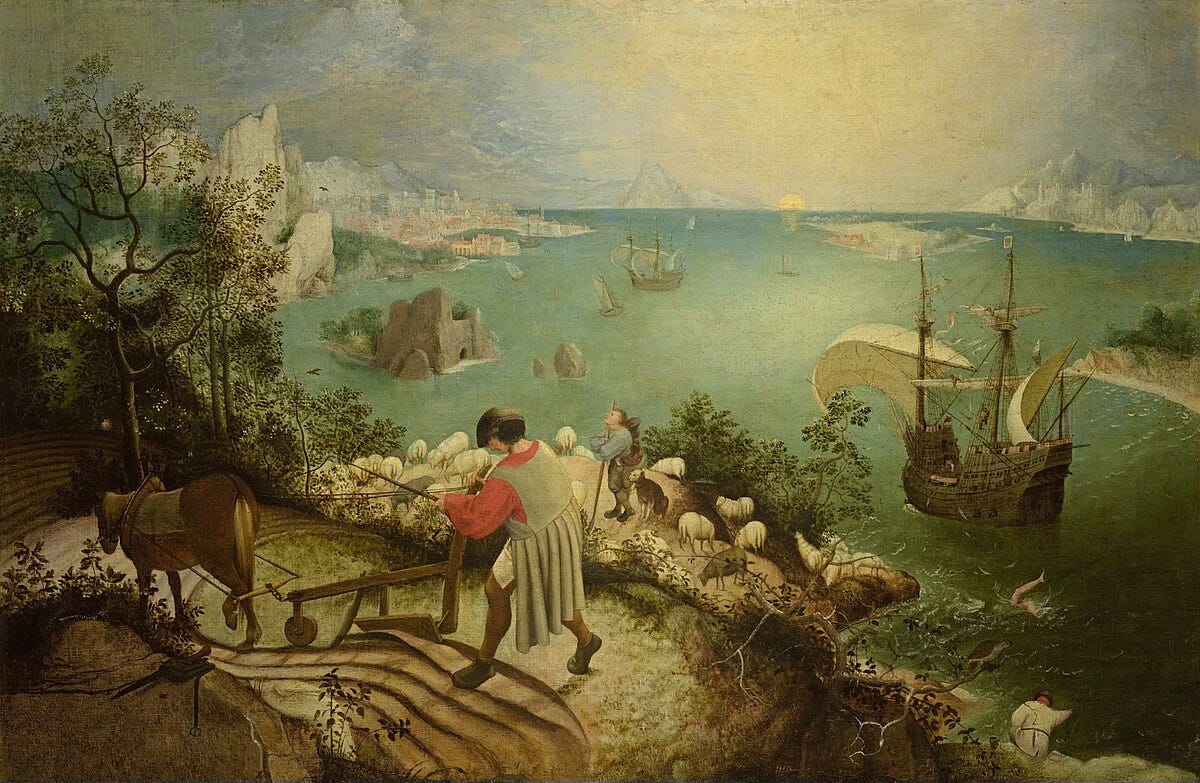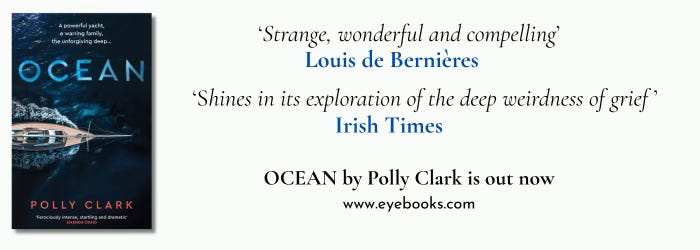Monday Night Reads brings you thoughtful writing direct to your inbox every Monday at 7pm.
Check out my recent viral posts The End of Nuance (about the Supreme Court judgement) and Cracks of Gold, Threads of Carbon (about this year’s Edinburgh International Book Festival).
My popular Letters from a Poet has over twenty specially recorded poems and letters reflecting on the writer’s life and topical subjects.
Paid subscribers can access the full serialisation of my much loved debut novel Larchfield.
If you appreciate my work here, consider supporting my writing with a paid subscription.
If you’d like to mark your appreciation for a particular piece, you can buy me a coffee here. I’m always grateful for these one-off gestures — and I do get through a lot of coffee writing these posts.
Dear Reader
The recent UK summer heatwave sent me 400 miles north from my boat on the Thames like a migrating bird, to where the Clyde Estuary flows into the inlets of the Gareloch and Loch Long on the west coast of Scotland. I lived along this stretch of stony, otherworldly shore with its strip of seaside town and slow patrol of submarines for nearly twenty years. My daughter was born here, as was my first novel, and this elemental landscape has become part of me.
Even here, it was too hot to go out during the day, so I waited till late in the evening, when the sun was setting, heading towards the fat, spearmint-striped lighthouse at Rhu that sits, at low tide, at the end of a long spit of pebbles. There, I turned to walk the shore alongside the Gareloch, towards the pier at the yacht club. It was approaching ten o’clock, and no one was around.
The water was a bleed of rose and gold from the sun. The Gareloch boats — specially made wooden sailing boats over 100 years old, which still race these waters every summer — were motionless on their moorings, casting shadows much larger than they were. The air was soft and still warm. I had no headphones, no telephone. Nothing to alter my mood or affect my attention.
In those years, I often felt alienated by this rocky landscape, lapped by the cold clear waters and crowned with a vast, solitary sky. The strangeness of the light often made me uneasy. And yet, the landscape has penetrated all my work, and filled it with otherworldliness. As a person, I am open, not in terms of confession, but in porousness. I have never been able to resist the outside world coming into me. I no longer try to resist. Instead, I try to pay attention, to the ebb and flow of what is internal and what is external.
Like the brackish water of the Gareloch, where fresh water meets salt, inside and out intermingle in me, so much so that I often cannot tell them apart. It is my work as a writer not to try to separate the salt water from the fresh: I have learned simply to tell truthfully what I see and feel. Not to drown, not to flee.
As I stepped on rocks that shone gold, and the sun slipped closer to the top of the hills, my familiar unease gave way to wonder. Beauty was revealing itself gently as it had perhaps always done, had I been able to appreciate it. Perhaps I needed the experience both of this place and my life away from it to let it be, without feeling overwhelmed by it, in this way allowing all of my life to co-mingle inside this moment.
Then, near to shore, where the water was shallowest, a fish jumped, clear from the water. Then another. And another, always just at the corner of my vision. Their falling arcs and lithe splashes accompanied me as I walked.
High on the pier leading to the Garelochs asleep at their moorings, I looked down upon the fish in the shallows. The leaps were every few seconds, followed by a silent explosion of tiny fish, like lightless fireworks radiating out from each splash. I had never seen this before. Mesmerised, I stood surrounded by the fish leaping and flashing below while the sun poured its deepening pink and gold towards the creeping dusk.
Into my mind drifted the lines from ‘Summertime’, the Gershwin song from the opera Porgy and Bess: ‘fish are jumping’ / and the cotton is high’. I felt an intense echo within me at that moment of both the beauty and the sorrow that reside deep inside that music, soaked in golden light and lullaby logic.
I returned home to a house asleep. It was not until the morning that I was able to relate this experience to my hosts. They dismissed my interpretation of the fish leaping and the tiny fish flashing as play. ‘No! It’s mackerel hunting the little fish!’ I was told.
What I had likely witnessed was a bait-ball assault in the shallows. Fast, predatory mackerel herd shoals of smaller fish, such as sprats or juvenile herring, into the shoreline and then strike from below. The small fish perform what marine biologists call flash expansion: an explosive, coordinated scatter. These were my lightless fireworks. The mackerel breach the surface in pursuit, in silhouetted arcs that look, from a distance, like play.
It happens at dusk, especially after a hot day, when oxygen levels drop and everything rises toward the cooling surface. It’s efficient, brutal, and ancient. The shallows become a theatre of need.
This was so at odds with the peace of the scene that I found it hard to believe. But it was not at odds with the melancholy I’d felt, nor with the sadness in the reference to the fish jumping in ‘Summertime’. The line from the song unfurled again, but this time differently. The fish are jumping because they have to. Because death is coming from below. The cotton is high, yes, suggesting plenty, but it will be picked by those who won’t share in that plenty. ‘Summertime’ isn’t a lullaby because the child is safe. It’s a lullaby because he isn’t. Its beauty doesn’t soothe away danger: it shelters you from knowing it, even as it holds the truth for you to find.
The beauty I saw in the fish jumping at sunset was not innocent. I had mistaken what I was seeing. But the feeling of the scene — beauty and sorrow together — was there nonetheless, and that floating line of song crystallised the paradox, and drove me to seek the full story.
Crucially, the beauty of that moment wasn’t cancelled by the new knowledge. It was made more intricate. Like the Gareloch itself, salt and fresh commingling, the scene now held both truths — peace and panic — at once.
This discovery lifted me from any sentimentality and into the duality that ‘Summertime’ evokes. And brought to mind a poem I have always loved, about that very failure to witness.
W. H. Auden’s ‘Musée des Beaux Arts’ has always felt like part of my lexicon, but now revealed itself anew. It’s a poem about how suffering is rarely met with appropriate response. About how, in the face of pain or disaster, the world simply keeps going: “eating or opening a window or just walking dully along.” In the Brueghel painting Auden describes, Icarus falls from the sky, and no one turns to watch. The ploughman may hear the splash, but “for him it was not an important failure.” Even the delicate ship “that must have seen / something amazing” sails calmly on.
It’s a poem about misplaced attention. Or rather, about how the conditions of ordinary life make us blind to catastrophe. How beauty itself can mask what’s unfolding just beneath the frame, unless you can learn to feel the truth of what’s before you, even before you see it.
Auden doesn’t condemn the ploughman. He simply observes the failure. And that is what the leaping fish were showing me. How to name the moment when beauty and suffering occupy the same light. When the watcher sees one, then learns of the other, and finds a way to hold them both.
On another walk, the water was still beneath the pier. The Gareloch held no sign of what had passed: no shimmer, no scatter, no splash. Just the tide breathing against the stones. And yet the moment stays with me, as all real seeing does. Something had been opened in me. I had glimpsed beauty, and then I had glimpsed its cost. And then, quietly, both together.
Thank you for reading.
Until next time,
Polly x
If you have enjoyed this piece please share it with your friends.
If you’d like to mark your appreciation for this particular piece, you can buy me a coffee here. I’m always grateful for these one-off gestures, and I do get through a lot of coffee writing these posts.







